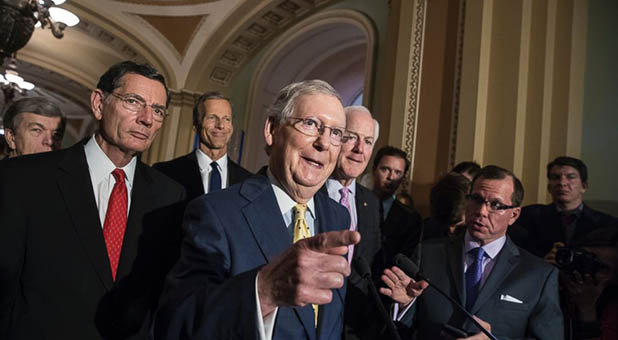The “secret” bill 13 Republican senators have been working on to repeal and replace the Affordable Care Act, also known as Obamacare, is no longer a secret.
Thursday morning, the Senate Republican Conference released the full draft of its Better Care Reconciliation Act of 2017, which is its alternative to the House Republicans’ American Health Care Act. Along with the full text of the bill—click here to read it—they also released a brief “explainer” about the bill, which states:
Seven years ago, Democrats imposed a risky health care experiment on Americans that led to skyrocketing costs and collapsing insurance markets. Senate Republicans are working to fix the mess Democrats made by acting to rescue the millions trapped by Obamacare. The discussion draft will:
- Help stabilize collapsing insurance markets that have left millions of Americans with no options.
- Free the American people from the onerous Obamacare mandates that require them to purchase insurance they don’t want or can’t afford.
- Improve the affordability of health insurance, which keeps getting more expensive under Obamacare.
- Preserve access to care for Americans with preexisting conditions, and allow children to stay on their parents’ health insurance through age 26.
- Strengthen Medicaid for those who need it most by giving states more flexibility while ensuring that those who rely on this program won’t have the rug pulled out from under them.
So, how exactly do they intend to do all that? Well, everyone’s still trying to read the bill, which comes in at 142 pages. But here’s what we know so far.
The BCRA will establish a short-term stabilization fund that will be used to “balance premium costs” with the hope of keeping insurers in the individual insurance market. The plan calls for $15 billion a year in 2018 and 2019 and $10 billion a year in 2020 and 2021.
It also keeps in place “cost-sharing reductions”—i.e. federal subsidy payments—through 2019 in order to keep as many low-income Americans as possible from being driven out of the marketplace by high premiums.
According to Senate Republicans, the BCRA also fully repeals both the individual and employer insurance mandates. This was a key provision that House Republicans demanded in the bill.
The legislation will make health insurance more affordable, they claim, with five new provisions:
- Long-Term State Innovation Fund that dedicates $62 billion over eight years to encourage states to assist high-cost and low-income individuals to purchase health insurance by making it more affordable.
- Targeted Tax Credits that are both “advanceable” and “refundable”—adjusted for income, age and geographic location—and are meant to defray a portion of the cost of purchasing insurance.
- Health Savings Accounts will be expanded to provide greater flexibility and to allow increased contribution limits to pay for out-of-pocket expenses and over the counter medications.
- Repeals Obamacare taxes that have contributed to skyrocketing premium increases and hurt the health care industry’s ability to innovate.
- Empowers states through existing waivers within Obamacare—with fast-track approvals from the Department of Health & Human Services—to allow them to decide their own rules of insurance and how to better allow customers to buy the health insurance they want.
The BCRA also retains the Obamacare provisions for coverage of preexisting conditions and adult children to remain on parents’ plans through age 26, and makes no changes to veterans and Medicare and Social Security recipients. It also includes a number of provisions related to Medicaid.
The bill includes these new Medicaid provisions:
- rolls back Medicaid expansion funds over a four-year period, beginning in 2021
- guarantees coverage for children with “medically complex disabilities”
- provides additional state flexibility to deal with substance abuse and mental health issues
- allows states to choose between block grant and per-capita support for Medicaid funding, beginning in 2020
- allows states to impose work requirements for non-pregnant, non-disabled, non-elderly individuals receiving Medicaid
- limits “Medicaid funding gimmicks” that drive up federal costs.
Senate Majority Leader Mitch McConnell, R-Ky., made the following comments on the floor of the Senate regarding the BCRA and the need to repeal and replace Obamacare:
Seven years ago, Democrats imposed Obamacare on our country. They said it would lower costs. It didn’t. From 2013 to 2017, premiums have on average doubled in the vast majority of states on the federal exchange. Next year, Obamacare premiums will go up across the country again—potentially by as much as 43 percent in Iowa and 59 percent in Maryland, even a staggering 80 percent in New Mexico. Does it sound like Obamacare is working? They said it would increase choice. It didn’t. This year, 70 percent of American counties have had little or no choice of insurers under Obamacare. Next year, at least 44 counties are projected to have no choice at all—meaning, yet again, Americans could be thrown off their plans in states like Missouri and Ohio and Wisconsin. Does it sound like Obamacare is working?
Now Democrats tell us it would be wrong for the Senate to actually address these problems in a serious way while the law they’ve defended for seven years teeters on the edge of total collapse. They were wrong before. They’re wrong again now. Because Obamacare isn’t working, by nearly any measure it has failed, and no amount of 11th hour reality-denying or buck-passing by Democrats is going to change the fact that more Americans are going to get hurt unless we do something. I regret that our Democratic friends made clear early on that they did not want to work with us in a serious, bipartisan way to address the Obamacare status quo, but Republicans believe we have a responsibility to act—and we are.
For our constituents, for our states, for our country, we’ve long called for a better way forward. And we’ve been engaged in intensive talks on how to get there. Through dozens of meetings, open to each and every member of the Conference, we had the opportunity to offer and consider many ideas for confronting the Obamacare status quo. We debated many policy proposals. We considered many different viewpoints. In the end, we found that we share many ideas about what needs to be achieved and how we can achieve it. These shared policy objectives and the solutions to help achieve them are what make up the health care discussion draft that we talked through this morning.
We agree on the need to free Americans from Obamacare’s mandates, and policies contained in the discussion draft will repeal the individual mandate, so Americans are no longer forced to buy insurance they don’t need or can’t afford, and repeal the employer mandate so Americans no longer see their hours and take-home pay cut by employers because of it.
We agree on the need to improve the affordability of health insurance, and policies contained in the discussion draft will eliminate costly Obamacare taxes that are passed on to consumers so we can put downward pressure on premiums, expand tax-free health savings accounts and deploy targeted tax credits so we can help defray out-of-pocket costs and shift power from Washington to the states so they have more flexibility to provide more Americans with the kind of affordable insurance options they actually want.
We agree on the need to stabilize the insurance markets that are collapsing under Obamacare as well, and policies contained in the discussion draft will implement stabilization policies, so we can bring financial certainty to insurance markets and hope to Americans who face the possibility of limited or zero options next year under Obamacare, and ultimately transition away from Obamacare’s collapsing system entirely so more Americans will not be hurt. We also agree on the need to strengthen Medicaid, preserve access to care for patients with preexisting conditions and allow children to stay on their parents’ health insurance through the age of 26.
I’m pleased that we were able to arrive at a draft that incorporates input from so many different members who represent so many different constituents who are facing so many different challenges. The draft containing the solutions I mentioned—along with many others—is posted online, and I encourage everyone to carefully review it. There will be ample time to analyze, discuss and provide thoughts before legislation comes to the floor. I hope every Senator takes that opportunity. Next week, we expect the Congressional Budget Office to release a score. After that, we will proceed with a robust debate and an open amendment process on the Senate floor—a process that I would encourage each of our 100 Senators to participate in.
When legislation does come to the floor, it will present Senate Democrats with another opportunity to do what’s right for the American people. They can choose to keep standing by as their failing law continues to collapse and hurt more Americans, but I hope they will join with us instead to bring relief to the families who have struggled under Obamacare for far too long. Either way, we have to act. Because Obamacare is a direct attack on the middle class, and American families deserve better than its failing status quo—they deserve better care. That’s just what we’re going to continue working to bring them.
The bill makes no mention of defunding Planned Parenthood, even for one year as House Republicans requested, and it does not mention repealing the community ratings and essential health benefits provisions of Obamacare—arguably the biggest drivers of premium increases. House Freedom Caucus Chairman Mark Meadows, R-N.C., issued a brief statement that he was still reading the bill and that he looked forward to “going to conference” and getting a final bill passed. {eoa}
See an error in this article?
To contact us or to submit an article























